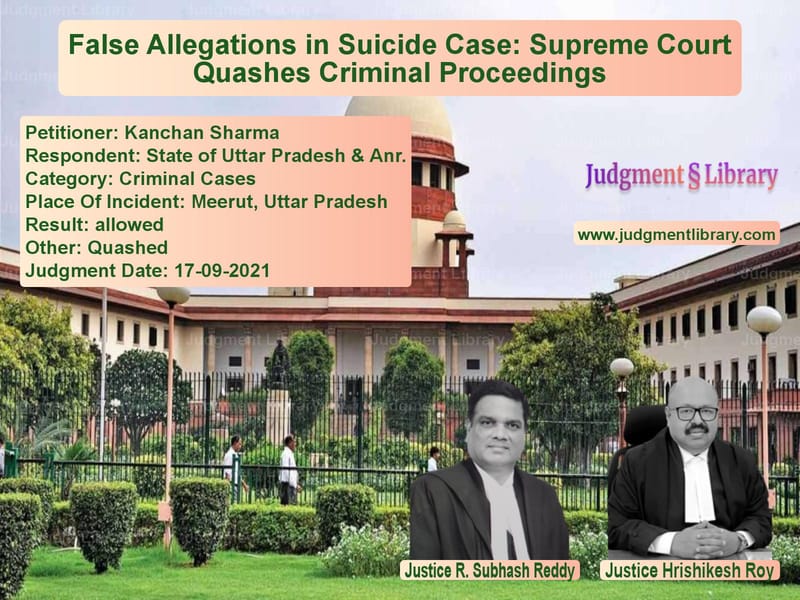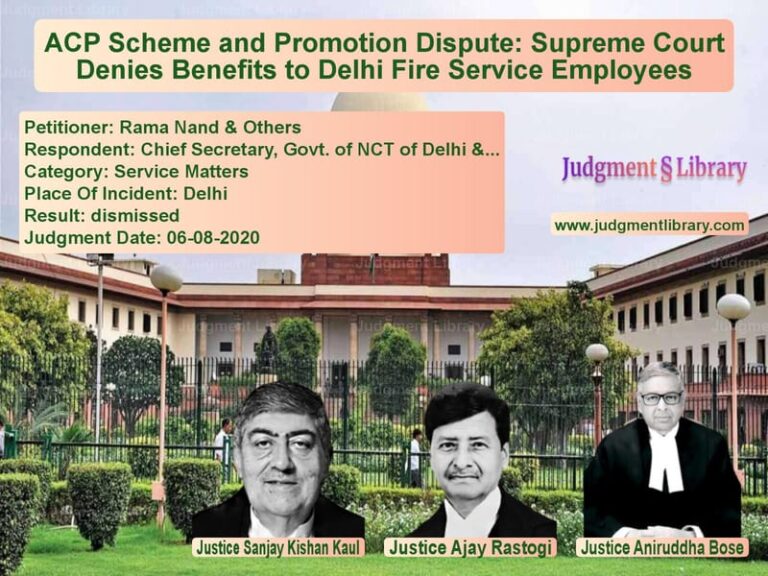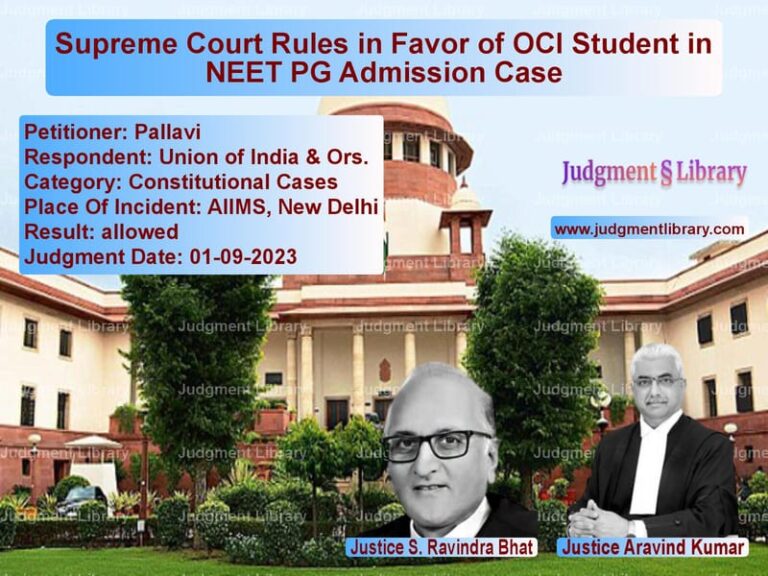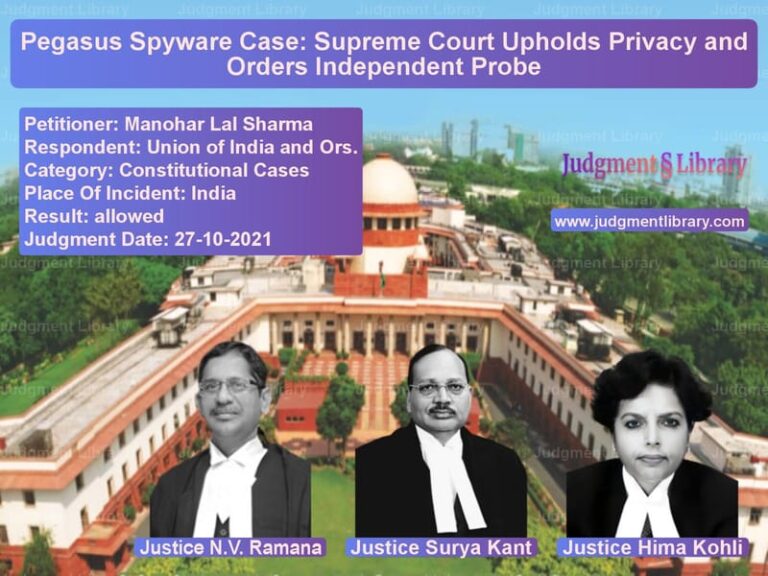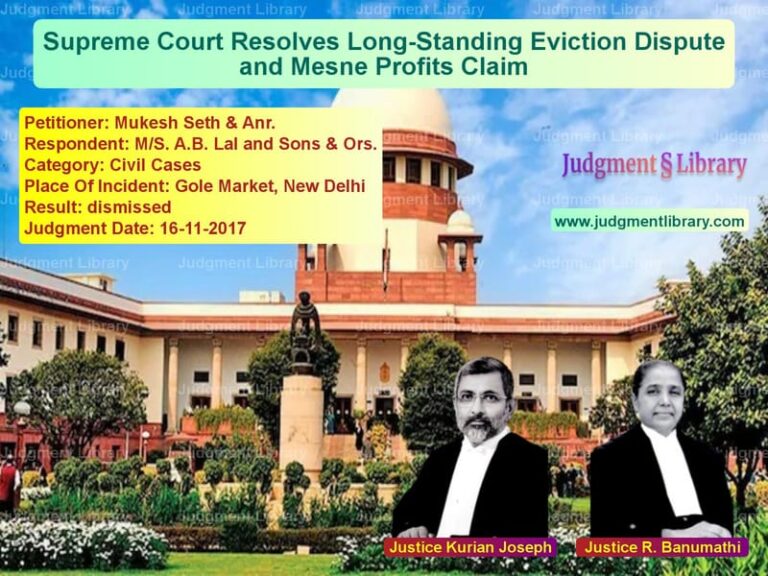False Allegations in Suicide Case: Supreme Court Quashes Criminal Proceedings
The case of Kanchan Sharma v. State of Uttar Pradesh & Anr. revolved around allegations of abetment to suicide under Section 306 of the Indian Penal Code (IPC) and Section 3(2)(v) of the Scheduled Castes and Scheduled Tribes (Prevention of Atrocities) Act, 1989. The Supreme Court examined whether the accusations against the appellant were legally sustainable or if they lacked sufficient material evidence.
Background of the Case
An FIR was registered on May 11, 2018, in Crime No. 278/2018 at T.P. Nagar Police Station, Meerut, Uttar Pradesh. The complainant, Vijaydeep, alleged that his brother Vikas (the deceased) was called by the appellant, Kanchan Sharma, to her house on May 4, 2018. It was further alleged that the appellant’s family members verbally abused Vikas using caste-based insults and forcefully administered poison, leading to his unconsciousness. He was taken to a hospital, where he later died.
Initially, the FIR was registered under Sections 328 and 302 of the IPC, along with Section 3(2)(v) of the SC/ST Act. However, after investigation, the police filed a final report charging only the appellant under Section 306 (abetment of suicide) of the IPC and Section 3(2)(v) of the SC/ST Act. On February 21, 2019, the Additional District & Sessions Judge (SC/ST Act), Meerut, took cognizance and issued non-bailable warrants against the appellant.
Key Issues Before the Supreme Court
- Whether the allegations against the appellant constituted the offense of abetment to suicide under Section 306 IPC.
- Whether there was any material evidence to invoke Section 3(2)(v) of the SC/ST Act.
- Whether the High Court erred in dismissing the appellant’s plea under Section 482 Cr.PC for quashing the criminal proceedings.
Arguments by the Appellant
The appellant, Kanchan Sharma, contended that:
- She had no role in instigating or aiding the deceased to commit suicide.
- The deceased had been harassing her by following her and repeatedly proposing marriage.
- On the day of the incident, the deceased arrived at her house, shouted that he would marry her, and suddenly consumed poison from a bottle he had brought.
- There was no material evidence showing that she abetted the suicide.
- The allegations of caste-based abuse were vague and lacked corroborative evidence.
Arguments by the Respondents
The State of Uttar Pradesh contended that:
- The deceased was in a relationship with the appellant, and his suicide was a consequence of her refusal to marry him.
- The appellant and her family members had verbally abused the deceased, leading him to take his life.
- The statements of witnesses indicated a connection between the appellant’s actions and the suicide.
Supreme Court’s Analysis
The Supreme Court, comprising Justices R. Subhash Reddy and Hrishikesh Roy, examined the allegations and evidence presented in the case.
Key Findings
- No Evidence of Abetment: The Court emphasized that abetment requires a positive act of instigation or intentional aid. The mere refusal to marry or rejection of a proposal does not constitute abetment to suicide.
- Failure to Establish Mens Rea: There was no evidence indicating that the appellant acted with the intent to push the deceased to commit suicide.
- Contradictions in the Prosecution’s Case: The complainant’s claim that poison was forcibly administered contradicted the police investigation, which concluded that the deceased had consumed poison himself.
- No Basis for SC/ST Act Charges: The vague and unsubstantiated claim of caste-based abuse failed to meet the legal threshold required to invoke Section 3(2)(v) of the SC/ST Act.
Key Observations by the Supreme Court
“Abetment involves a mental process of instigating a person or intentionally aiding a person in doing a thing. Without a positive act on the part of the accused, conviction under Section 306 IPC cannot be sustained.”
“The mere fact that the deceased was in love with the appellant and committed suicide when his proposal was not accepted does not mean the appellant had abetted the suicide.”
Final Judgment
The Supreme Court ruled:
- The High Court erred in refusing to quash the criminal proceedings.
- The non-bailable warrants and proceedings under Special Trial No. 23 of 2019 were quashed.
- The appeal was allowed, and the appellant was relieved from all charges.
Implications of the Judgment
This ruling has several key implications:
- Strict Interpretation of Abetment to Suicide: The decision reinforces that refusal to marry or rejection of a relationship does not amount to abetment.
- Burden of Proof in SC/ST Cases: Vague allegations of caste-based abuse will not be entertained without concrete evidence.
- Preventing Misuse of Criminal Laws: The judgment serves as a safeguard against frivolous and malicious prosecutions.
Conclusion
The Supreme Court’s ruling in Kanchan Sharma v. State of Uttar Pradesh sets an important precedent in criminal law. The judgment reiterates that courts must be cautious while dealing with allegations of abetment to suicide and ensure that criminal charges are not misused as a tool for harassment. By quashing the case, the Court upheld the principle that mere emotional distress or rejection in a relationship cannot be grounds for criminal liability.
Petitioner Name: Kanchan Sharma.Respondent Name: State of Uttar Pradesh & Anr..Judgment By: Justice R. Subhash Reddy, Justice Hrishikesh Roy.Place Of Incident: Meerut, Uttar Pradesh.Judgment Date: 17-09-2021.
Don’t miss out on the full details! Download the complete judgment in PDF format below and gain valuable insights instantly!
Download Judgment: kanchan-sharma-vs-state-of-uttar-prade-supreme-court-of-india-judgment-dated-17-09-2021.pdf
Directly Download Judgment: Directly download this Judgment
See all petitions in Suicide Cases
See all petitions in SC/ST Act Case
See all petitions in Judgment by R. Subhash Reddy
See all petitions in Judgment by Hrishikesh Roy
See all petitions in allowed
See all petitions in Quashed
See all petitions in supreme court of India judgments September 2021
See all petitions in 2021 judgments
See all posts in Criminal Cases Category
See all allowed petitions in Criminal Cases Category
See all Dismissed petitions in Criminal Cases Category
See all partially allowed petitions in Criminal Cases Category

